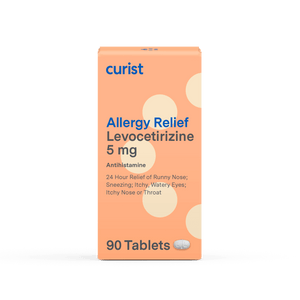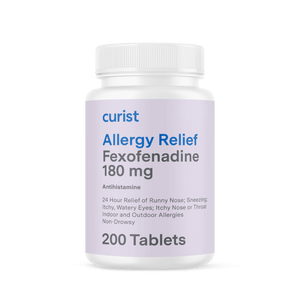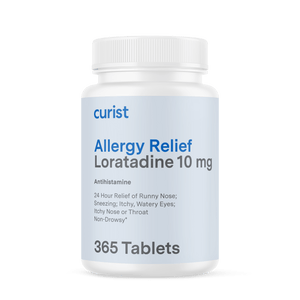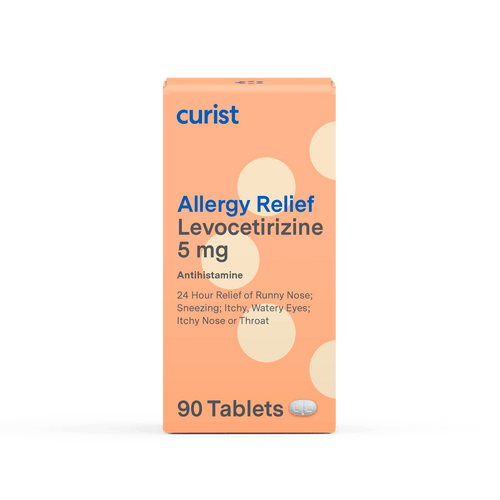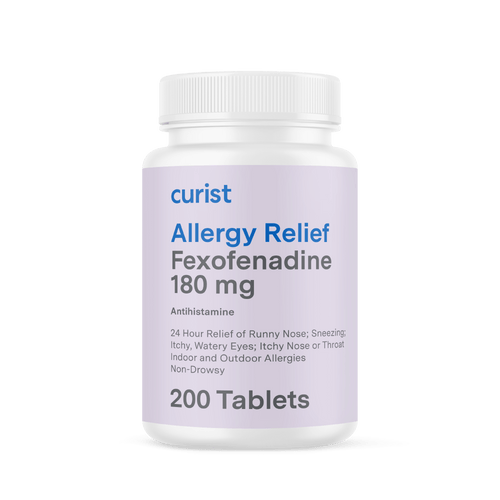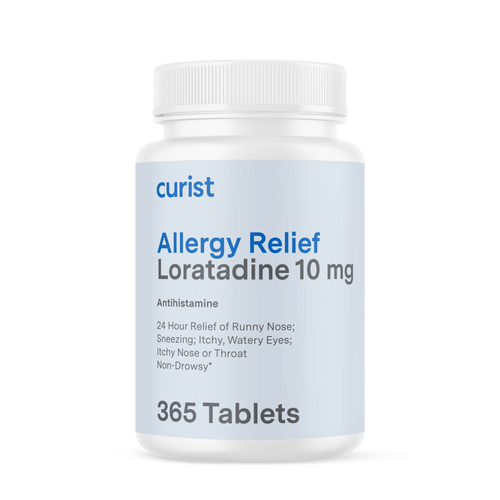Curist delivers over-the-counter medicines to your door at a fraction of the price of traditional brands. We hope everyone stays safe and healthy during this time.
Our barking best friends bring us a lot of love and joy, but unfortunately dogs can also bring pet dander. Do not worry, many people love and live with their pups despite dog allergies! Read more for tips and tricks on managing allergies to a person’s fluffy best friend.
How Do I Know If I Am Allergic to Dogs?
The National Institute of Environmental Health Sciences (NIEHS) reports that more than 50% of American households own a cat, dog, or both; however, what is even more surprising is that almost all US homes have traces of some dog and cat allergens even if they do not have a pet! Many people will blame dog hair for their allergies, but dog hairs only carry pet allergens. The biggest source of dog allergens is dog dander, though dog allergens are also found in their saliva, blood, and urine. Therefore, even hairless dogs can cause some allergy symptoms.
Dog dander is made of tiny skin flakes that shed from our furry friends, which can travel through the air and settle on clothing, furniture, and carpet. When we walk through our homes, we may inhale this dander, triggering allergy symptoms such as coughing, itchy eyes, watery eyes, skin rash, hives, runny nose, or sneezing. Even after a dog leaves the home, you can experience these symptoms for months or years!
Additionally, when you take your dog on a walk or leave them outside, they can bring in other allergens like pollen, ragweed, or mold, into your home as well. Without proper treatment, these mild symptoms may get worse over time causing asthma flare-ups, infections, chronic sinus headaches. However, even though dog allergies do exist, there are ways to manage your allergy symptoms without parting ways with your adorable dog.
Can I Suddenly Become Allergic to Dogs?
Yes, it is possible to become allergic to dogs at any age. Dog allergies are less common than cat allergies, but the symptoms of dog allergies can be more severe, especially if you also have asthma. If you ever experience rapid heart rate, shortness of breath, wheezing, weakness or dizziness, you should seek medical attention right away.
If you notice new itchy eyes, watery eyes, or sneezing after adopting a dog or being around pets, you likely have dog allergies. It is possible to develop dog allergies at any age, especially if you or someone in your family has seasonal allergies or asthma. Some people experience a runny nose or nasal congestion after being around dogs for minutes, hours, or even a couple days; or notice new hives or an itchy rash when a dog licks their arm or face. If you are unsure, visit an allergy specialist so they can help you find the true source of your allergy symptoms! Talking to your doctor or pharmacist may also help you find medications that work best for you.
Can I Live with Dogs if I Have Allergies?
Yes, you can live with a dog even if you have dog allergies. Many people continue living with a pet even once they develop allergies. Follow these household tips to help reduce your dog allergy symptoms:
- When considering adopting a new furry friend, do a trial period to see how your family members react to the dog. Different dog breeds may not trigger your allergy symptoms as much as others.
- It is best practice to wash your hands immediately after playing with your dog. It can also help to bathe your dog weekly to reduce the amount of shedding and dander.
- Make the bedroom a dog-free zone to protect your area of rest and help you sleep.
- Use a high-efficiency particulate absorbing (HEPA) filter or purifier to clear the air and remove dog allergens
- Clean your walls, carpets, curtains, upholstery, furniture and bed linens often to remove dog allergens.
In rare cases, dog allergies can lead to a serious allergic reaction called anaphylaxis. Within minutes of exposure, if you experience face or throat swelling, rapid heart rate, shortness of breath, wheezing, blue skin, weakness or dizziness, you should seek medical attention right away.
How Can I Get Rid of Dog Allergies? Do Dog Allergies Go Away?
One way to treat your dog allergy symptoms is to visit an allergist or doctor so they can correctly identify the cause and offer medications for you to try. Each person responds differently to a drug, so it may take time to find the best one for you. There are also several types of over-the-counter products available to help you manage dog allergies:
- Antihistamines: Oral medications such as Curist Allergy Relief (levocetirizine), fexofenadine (brand Allegra), and cetirizine (brand Zyrtec) are great options that help treat allergy symptoms from pets, pollen or ragweed.
- Nasal Saline Rinse: If you need to clear your nose of mucus, there are saline sprays and nasal lavage kits that use distilled water and table salt to help with congestion.
- Nasal corticosteroids: Curist Allergy Nasal Spray (fluticasone propionate 50 mcg) hits symptoms right at the source to decrease congestion, runny nose, and sneezing.
- Decongestants: There are oral and nasal decongestants available in front of and behind the pharmacy counter to help reduce congestion.
- Eye Drops: Using these can help any redness, itchiness, and tearing from pet allergies.
- Allergy Shots: For children and adults over 5 years old, you can consider this option for additional relief, though it may require several shots over the course of months or years.
What are the Best Antihistamines for Dog Allergies?
Some of the best oral antihistamines for dog allergies include Curist Allergy Relief (levocetirizine), fexofenadine (brand Allegra), and cetirizine (brand Zyrtec), which can help reduce your sneezing and itching. However, it really depends on which antihistamine works best for you to treat your dog allergies so it can take time to trial different medications and find the one that fits into your lifestyle.
If over-the-counter antihistamines, decongestants, and nasal sprays do not provide you with adequate relief, you can always visit an allergy specialist to discuss allergy shots as an option. Allergy shots are a very effective treatment for dog allergies, though, these can take a long time and several shots to work. We understand that managing a dog allergy can be stressful for you and your family, but we hope that these tips and medications can help you build a dog-friendly and allergy free home.




